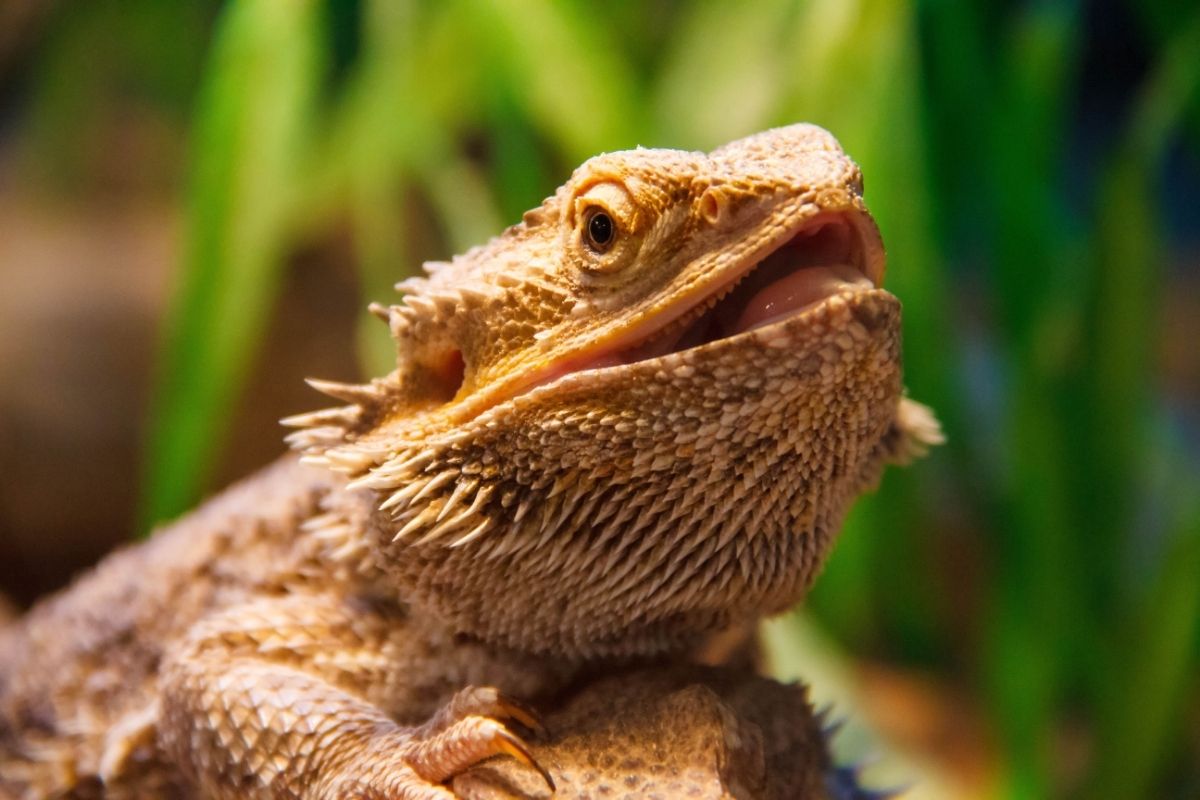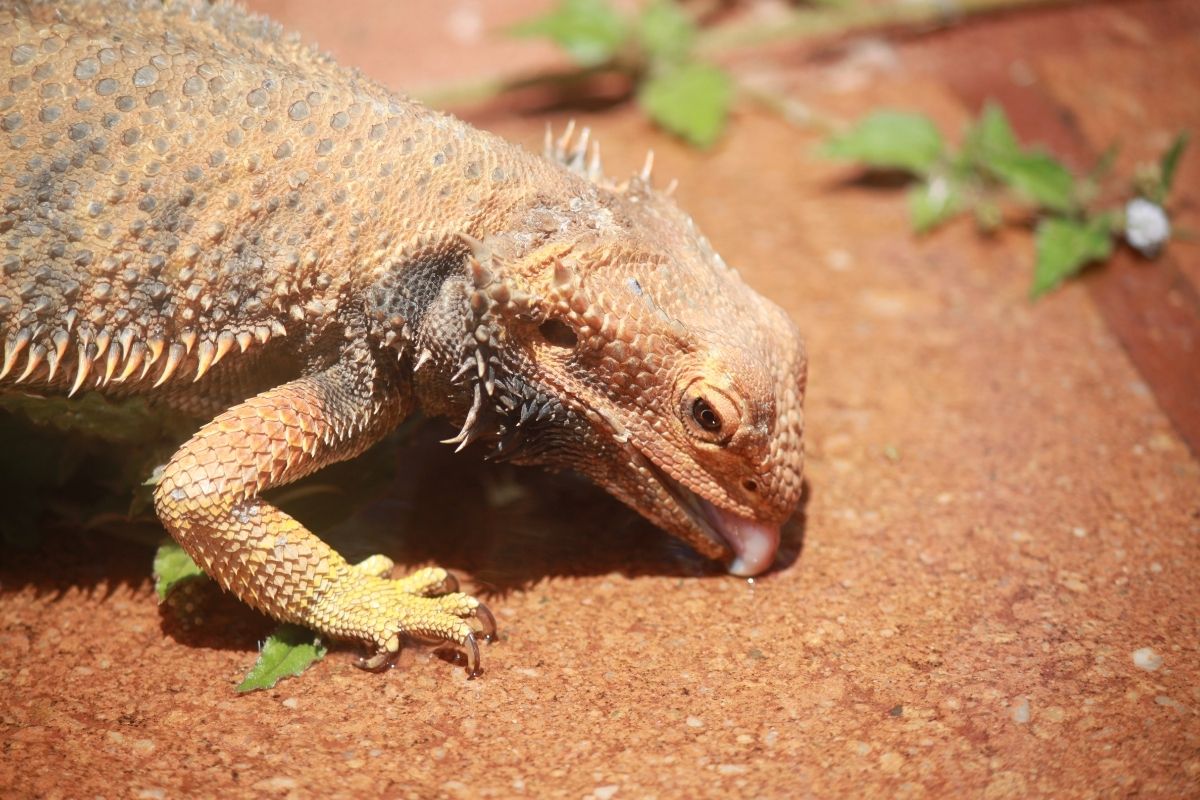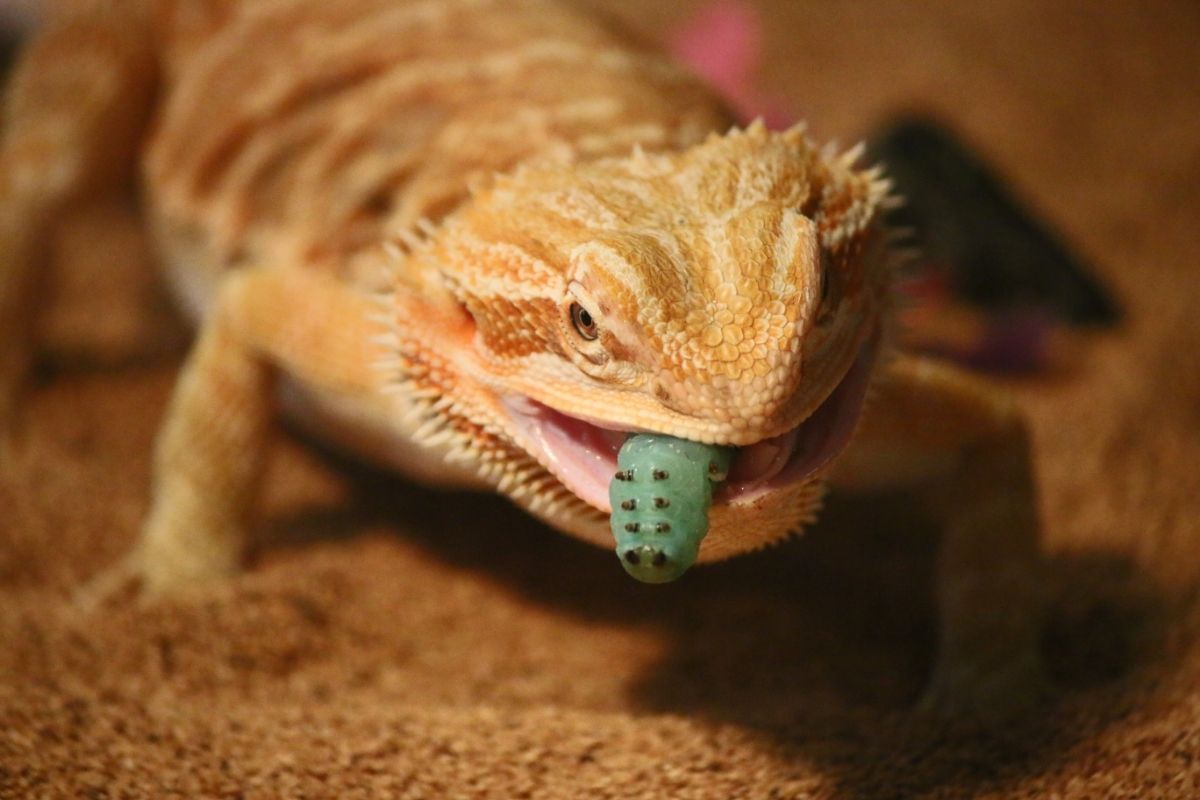Bearded dragons are known for their long tongues, and they also love fruit.
But can they eat mangoes?

Bearded dragons are lizards native to Australia.
They are very social animals who live in groups called colonies.
These colonies usually consist of several males and females.
The males are larger than the females.
Their coloration varies from light brown to dark green.
Mango trees are native to tropical regions around the globe.
Mango fruits are rich in vitamin C, fiber, potassium, and other nutrients.
If you want to feed your bearded dragon some mangoes, you should choose the ripe ones.
In this article, we have a look at whether bearded dragons like mango and what the benefits are of feeding your pet bearded dragon this tasty fruit.
Let’s jump in.
A Bit About The Bearded Dragon
The bearded dragon is an Australian lizard that belongs to the family Agamidae.
It has been domesticated since the early 1900s.
This species of lizard is popular because it is easy to care for and maintain.
You will need to provide them with a safe enclosure, food, water, and shelter.
If you’re looking to buy a bearded dragon, there are many different varieties available on the market today.
Most of these bearded dragons come from breeders who raise them as pets.
Some of these breeds include:
- African Dwarf
- Blue-tongued
- Black
- Common
- Green
- Long-nosed
- Red
- Short-nosed
- White
But when it comes to feeding time, you might be wondering whether you can feed your bearded dragon fruit as a tasty and nutritious treat and whether mango can be included in this.
Are Bearded Dragons Able To Eat Mango Without Harm?
According to vets and experts in the reptile world, bearded dragons are able to eat mango relatively safely.
Mango could be given to your beardie on occasion and can be included as part of a nutritious and balanced bearded dragon diet.
However, mango contains lots of sugar and is low in vital nutrients like calcium, so should not be the only option on the menu.
Mango is safe for bearded dragons, but you should use it in moderation.
There are some health benefits to eating mango, but there may also be some risks involved and that is what we are going to explore later in this article.
Mango Nutritional Information
When it comes to the nutritional information of a mango, it’s important to note that mango is a fruit that contains high levels of vitamin A, vitamin C, fiber, potassium, iron, magnesium, niacin, folate, pantothenic acid, riboflavin, and thiamine.
Mangoes also contain a lot of antioxidants that help fight free radicals.
Mangoes are a good source of vitamins B6 and E, copper, zinc, selenium, phosphorous, folic acid, beta carotene, biotin, vitamin K, iodine, sodium, chromium, lutein, zeaxanthin, and vitamin D.
Mangoes are low in saturated fats and cholesterol.
With all these benefits, surely it’s good to feed your beardie, right?
In one serving of mango, you will find it has:
- Energy 60 Kcal
- Protein 0.82 g
- Total lipid (fat) 0.38 g
- Carbohydrate 14.98 g
- Fiber 1.6 g
- Sugar 13.66 g
- Calcium 11 mg
- Phosphorus 14 mg
- Sodium 1 mg
- Vitamin C 36.4 mg
- Iron 0.16 mg
- Vitamin D (D2+3) 0 µg
- Vitamin B6 0.119 mg
- Vitamin A 54 µg
- Vitamin E 0.9 mg
- Vitamin K 4.2 µg
What Are The Benefits Of Bearded Dragons Eating Mango?
Mangoes are delicious fruits, but they’re necessarily healthy for bearded dragons.
Adding mangoes to your bearded dragon’s diet may make them want to eat more, but it doesn’t help them get healthier, as opposed to other similar greens and veggies.
Bearded dragons however love the smell of sweet fruit such as mango, and its sweet and juicy taste is also more appealing than the other staple veggies and greens you feed them regularly.
This means that if your bearded dragon is a fussy eater and refuses to eat their greens, you could use mango as a salad topper, and this will encourage them to approach the bowl and start eating.
If you chop up the mango into smaller pieces, they will usually pick up the other greens at the same time and won’t even notice they’ve been slipped the healthy stuff.
It’s not a long-term solution to get them to eat their greens, however, and you should stick to only doing this for about a week.
This means the bearded dragon can get into the habit of eating veggies and greens, and then you can remove the mango.
Dangers Of Bearded Dragons Eating Mango?

Sugar
Mango is very sweet, so it can be harmful to bearded dragons.
Bearded dragons need to eat mangoes in moderation.
Too much sugar causes dental issues, and mango is particularly high in sugar.
Plaque can build up and cause decay, just like it can with human teeth.
This can pose a dangerous problem, as beardies teeth are wired into their jaws, and infections and inflammation can lead to bigger issues and lots of trips to the vet.
Sugar can also have other negative effects if they end up eating it too often, and therefore you need to limit their intake.
One negative effect is that they can become obese, but it can also lead to digestive problems such as stomach aches or diarrhea.
This, as a result, can make your bearded dragon dehydrated and unwell.
Calcium
Mango is considered a healthy fruit because it contains lots of vitamins and minerals, including vitamin C, potassium, phosphorus, magnesium, and iron.
However, it also contains almost zero calcium.
This means that if your bearded dragon is fed mangoes as its only source of fruit, he won’t get any.
You also run the risk of them filling up on the fruit and then not having any room left to fill up on healthier stuff that does contain calcium.
Calcium is vital to the health of your bearded dragon as it helps keep bones strong and healthy.
It also helps regulate blood pressure and heart rate and aids muscle contraction.
Without enough calcium, your bearded dragon will suffer from brittle bones, which can lead to fractures and broken limbs.
They could even get metabolic bone disease if they are not given enough nutrient-dense foods with calcium.
Your beardies should have more calcium than phosphorus.
Calcium gets stored in your beardies’ bones, while phosphorus gets stored in your beardie’s teeth.
Mango contains more phosphorus than calcium.
Therefore, it’s not good to feed them mango regularly as if they end up having more phosphorus than calcium, the calcium will not get absorbed.
Calcium supplements are highly recommended when feeding mango.
But always choose a reliable brand and check with your vet first.
Seeds
Another danger with feeding mango to your bearded dragon is that he or she might accidentally swallow some seeds.
If you don’t know how to clean out the digestive tract of a bearded dragon, you need to seek professional help from an expert.
What About Baby Bearded Dragons?
Baby bearded dragons are different from adult ones.
Their diets are usually made up of baby food and soft fruits.
As they grow older, they start getting harder vegetables and meaty meals.
However, baby bearded dragons are safe to eat mango, but you need to be extra careful about overfeeding them.
Baby bearded dragons are continuously growing every day, and they need nutrient-dense foods with high amounts of calcium to continue to do so.
This means you should not allow them to fill up on foods such as mango, which might prevent this growth.
You can still offer mango and fruit as an occasional treat, but you need to know that the first 16-24 months are the most important to keep an eye on their diet, so they can grow big, strong, and healthy.
Should They Eat Mango Every Day?
Bearded Dragons should avoid eating Mangoes every day.
Mango is very high in sugar as well as very low in calcium.
That means if you feed them too much, they’ll get sick.
But if you give them some treats now and again, they’re happy!
The portion size should be small, but it should also be accompanied by a variety of vegetables.
Ideally, it could be used as a salad topping.
Try to stick to feeding them mango no more than once a month.
How Should They Eat Mango?

Mangoes are best eaten fresh.
When buying mangos for your bearded dragon, make sure they look firm and unblemished.
Avoid those that have been bruised or damaged.
Moreover, try to go for the organic kind as this means it will be guaranteed to be free of pesticides and herbicides.
If you buy frozen mango, thaw them before serving.
Frozen mango tends to lose its flavor quickly.
If you want to serve mangoes raw, peel them carefully before cutting them into pieces.
You can use a vegetable peeler to remove the skin easily.
When serving mangoes, cut them into slices or small chunks.
This way, they won’t choke on the whole piece, and they are more likely to pick up greens and veggies at the same time without realizing it.
When serving mangoes, avoid using a knife to cut them.
It may damage the flesh and cause it to spoil faster.
Instead, use a spoon to scoop out the flesh.
What If My Bearded Dragon Gets Sick From Eating Too Many Mangoes?
If your bearded dragon gets sick after eating too many mangos, then he’s probably suffering from indigestion.
This is caused by the excess sugars in mangoes.
Your bearded dragon has a very sensitive digestive system, and he cannot handle these types of foods.
He may even vomit if he eats too much.
To help him recover, you should provide him with plenty of water and let him rest for a few days.
Once his stomach is back to normal, you can start feeding him again.
If something seems more serious or if the problem does not go away, seek advice from a vet.
Overfeeding them can also lead to problems such as obesity, which is not good for their health.
It can also lead to problems such as constipation.
Constipation can be treated with natural remedies like pumpkin seeds, carrots, beetroot, and spinach, but you can also add probiotics to their diet to help prevent diarrhea.
You can find probiotic supplements online.
However, you need to check the ingredients first to know whether they contain harmful chemicals and always check with a vet before feeding.
Other Fruits To Feed Your Bearded Dragon
While mango is great for your bearded dragon, there are other fruits that you can feed them.
Here are some examples:
- Bananas – Bananas are excellent sources of potassium and vitamin B6. They are also rich in fiber and carbohydrates.
- Apples – Apples are an excellent source of fiber and minerals such as magnesium, manganese, copper, and phosphorus.
- Pears – Pears are a healthy alternative to apples because they are lower in calories and higher in fiber.
- Figs – Fig leaves are another option when it comes to fruit. These leaves are high in calcium and iron.
- Strawberries – Strawberries are rich in antioxidants and vitamins A and C.
- Watermelon – Watermelons are low in calories and are packed with nutrients, including lycopene, beta-carotene, and folate.
- Apricots – Apricots are high in vitamin E and fiber.
- Dates – Dates are rich in fiber and protein.
- Raspberries – Raspberries have a sweet taste and are high in vitamin C. Therefore very popular with beardies.
Frequently Asked Questions
How Much Should I Feed My Bearded Dragon?
The amount of food you give your bearded dragon depends on how big he is.
But bear in mind bearded dragons grow fast and usually reach adult sizes within two months.
Their growth rate varies depending on the breed.
For example, the African pygmy beard grows at a slower pace than the American bearded dragon.
Can Bearded Dragons Eat Mango?
Bearded dragons are able to eat mango relatively safely, but it needs to be consumed in moderation due to its high sugar and low calcium content.
What Fruit Is More Appealing Than Greens?
Bearded dragons love the smell of fruit such as mango, and its juicy taste is much more appealing than any other greens.
That’s why it is often used as a salad topper to encourage bearded dragons to eat their greens.
How Should I Prepare Mangos For My Bearded Dragon?
Mango is a fruit that is very nutritious for bearded dragons.
You should choose the right kind of mango.
Avoid over-ripened ones as they contain too much sugar and a high content of benzoic acid.
Wash the mango before feeding your pet to remove chemicals on the skin.
Allow to dry for 15 minutes before peeling.
Then, cut the flesh into small chunks.
Final Thoughts
We hope you have learned a little more about bearded dragons and whether they can eat mango.
We have gone through nutritional value, health benefits, how to prepare the fruit, and also the dangers of overfeeding your dragon the fruit.
Don’t forget to allow your beardie to try some of the other fruits we have mentioned too, and you should have one happy bearded dragon!
